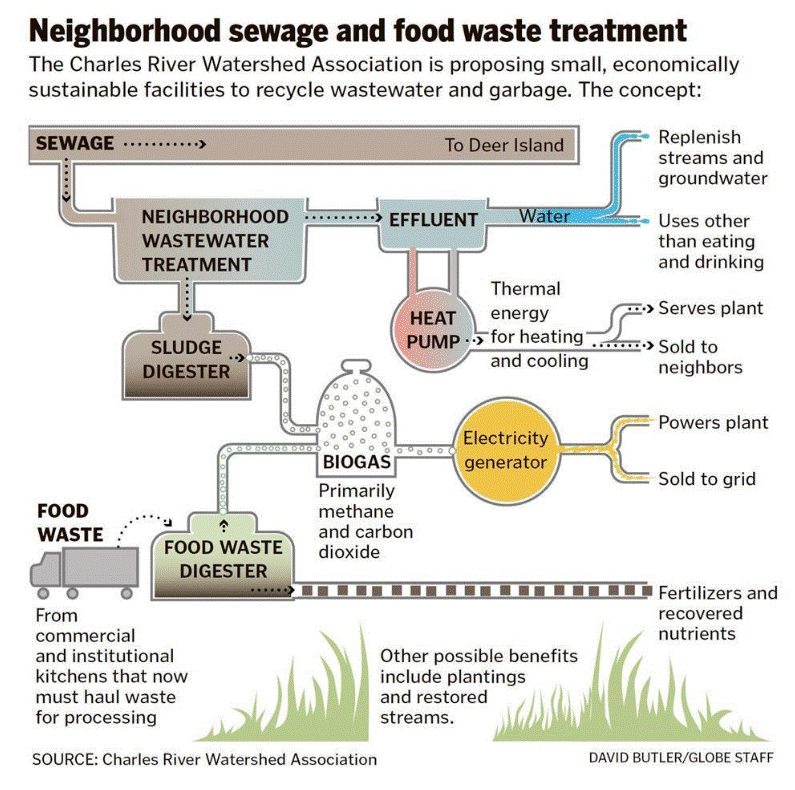

Recently, while pondering the potential role of distributed waste processing and distributed power generation in the context of smart cities, my thoughts reached back to when, during my tenure at a large automation supplier, we had to come to terms with losing a major I&C project for the massive Deer Island Wastewater Treatment Plant in Boston Harbor to a competitor. What made this loss even harder to swallow, was the fact that the plant was located less than 50 miles from our global headquarters, which housed the company’s main manufacturing, project engineering, and customer support organizations. What also hurt, was that we had a good track record of implementing successful I&C projects for other large-scale regional water and wastewater treatment plants around the country.
These mega projects typically involved both significant engineering challenges and risk but, nevertheless, were often given higher internal priority than the many smaller-scale, municipal-level water and wastewater treatment projects that came down the pike. This was largely because the smaller projects tended not to be very profitable (if at all) due the excessively cost-conscious nature of these municipalities.
Something that I recently read in e-newsletter item by Boston Globe business reporter, Jon Chesto, got me thinking that large regional treatment plants like the one on Deer Island, which processes sewage for more than 40 cities and towns in eastern Massachusetts, might not be the best solution for the smart cities of the future. For one thing, while the Deer Island plant certainly has done wonders to help the Massachusetts Water Resources Authority (MRWA) clean up the previously heavily polluted Boston Harbor and Charles River Basin (made famous by the Standell’s 1966 hit song, Dirty Water), according to the Bob Zimmerman, executive director of the Charles River Watershed Association (CRWA), Deer Island is “dewatering” eastern Massachusetts.
As an alternative to “hulking” sewage treatment plants, CRWA has proposed smaller, neighborhood treatment centers that would convert waste water and discarded food into energy, which would then be used to power the plant (waste treatment plants are highly energy-intensive). To help defray the project and operational costs, any excess electric energy would be sold to the grid and thermal energy sold to nearby industrial facilities. According to Jon Chesto’s e-newsletter item, “The nonprofit group’s primary aim in developing the concept was to limit the vast amounts of rainwater and ground water that get sucked into sewer pipes to be washed out to sea via Deer Island, a phenomenon that is harming the Charles River by decreasing its water volume.” In addition to helping protect area rivers, this approach could also bring more renewable energy into the area and restore now-buried waterways.
According to Mr. Zimmerman, this wouldn’t require any new technology; but would require moving from a centralized to a de-centralized sewer system and pairing it with waste processing and waste-to-energy technologies. Both the liquid sewer wastes and solid food wastes (collected from area restaurants and institutions) would first be pretreated and then processed in anaerobic digesters to break down the organic material and convert it to methane gas to generate electricity. The diagram also suggests that heat pumps could be used to capture thermal energy which could then be sold to nearby industrial facilities for heating and cooling purposes.
This appears to represent the kind of “out-of-the-box” thinking that is key for the successful transition from today’s relatively inefficient, energy-gobbling, environmentally harmful municipal models to the smart, sustainable cities and communities of tomorrow. According to Mr. Zimmerman, “It’s only waste water if you waste it.”
To its credit, while the MWRA’s Deer Island Wastewater Plant (which treats an average of 365 million gallons of wastewater per day), is one of the largest electricity users in the Northeast US, it does generate approximately one-quarter of its electricity needs in its 12 anaerobic digesters and more than half of the island’s total energy demand via on-site, renewable generation. However, unlike the proposed community facilities, Deer Island is too remote to share thermal energy.
The CRWA’s proposed approach addresses the multiple needs to increase the percentage of renewables in the energy mix, help restore natural environments, and “harden” communities against climate changed-induced weather patterns. It also at least recognizes the reality that the needed capital to finance many water and wastewater upgrade projects in the US and elsewhere is in very tight supply. Unlike a large-scale wastewater treatment facility or renewable energy project, this approach could be implemented in smaller, more manageable (and thus easier to finance) increments, one plant at a time, while helping pay for itself. The latter point could make it more attractive for public-private partnerships. It also addresses several challenges relative to liquid and solid waste treatment, renewable energy generation, and wetlands restoration.
CRWA hired New Jersey-based engineering firm, Natural Systems Utilities (NSU), to draw up conceptual plans and analyze the revenue potential for two possible plants in Boston. NSU determined that one of these plants would cost $47 million to build, with $7.4 million in projected annual revenue, which would more than offset the projected $5 million/year O&M costs (and – presumably - eventually pay for itself). NSU created a webcast on this concept for the American Society of Civil Engineers (ASCE).
Finally, I can’t help but think that these smaller, combined waste treatment/waste-to-energy plants would make excellent candidates for the highly distributed, open automation approach now being championed by the automation end users and suppliers in the Open Process Automation Forum (a forum of The Open Group), as well as more traditional PLC/HMI, and “DCS-lite” automation solutions.


